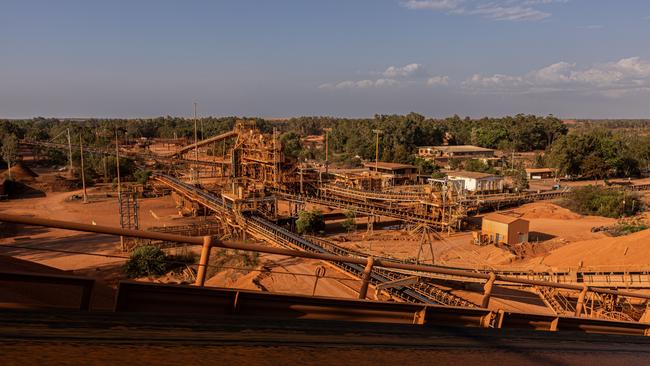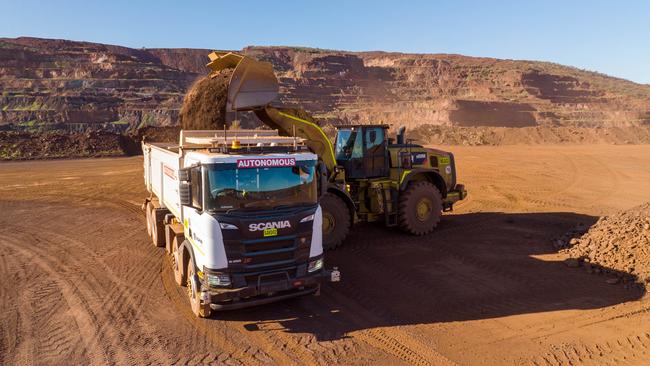Rio Tinto lifts first-half iron ore shipments, says it is on track for upper end of guidance
Rio Tinto has warned it still faces global headwinds from a softening economy as it reported its best iron ore exports in five years but slashed guidance for copper and alumina.
Rio Tinto has warned it still faces significant headwinds from a softening global economy, as the company reported its best iron exports in five years – but slashed guidance in its copper and alumina divisions.
Rio reported its June quarter production figures on Wednesday, with the company’s Pilbara mines delivering a strong first half of the year despite a four-day outage on its rail network – and the company saying it was on a path to hitting the top end of its full-year guidance.
But the company warned that China’s recovery was slowing, despite monetary easing measures, and said it still expected a recession in the US this year.
“China’s reopening recovery started strongly but slowed in the second quarter. Consumption is still improving, while weakness in the export and property sectors is providing a drag to growth. Factory activity has slowed down, as manufacturing PMI contracted,” the company said.
Rio said that while an increase in Chinese steel exports – to levels last seen in 2016 – had underpinned strong demand for iron ore, domestic demand faced “persistent headwinds” and, along with near record shipments from major iron ore producers in Australia and Brazil, that had put pressure on iron ore pricing.
“Iron ore prices declined by 12 per cent over the quarter as China’s steel demand recovery encountered persistent headwinds, and steel prices and mill profitability remained compressed. As a result, Chinese steel exports trended up sharply towards 100 million tonne annualised, run-rates last observed in 2016,” Rio said.

Rio Tinto’s WA iron ore operations look back on track to stability.
The miner major’s June quarter shipments fell slightly below the same period in 2022, to 79.1 million tonnes for the quarter, held back by a maintenance campaign at the company’s port operations in Dampier and a train derailment that forced the closure of a key line for four days.
Rio shipped 136.4 million tonnes in the first half of the year – up 8 per cent and its best result in five years – and now says it is on track to hit the upper end of its 320 to 335 million tonne shipment guidance for 2023.
But the company’s campaign to improve the grade and quality of its exports is paying off, as Rio’s Gudai-Darri mine hit its nameplate capacity on schedule. Only 12.5 per cent of the company’s shipments for the quarter were made up of lower grade products such as its SP10 blend, compared to almost 17 per cent in the June quarter 2022.
And Rio’s average discount to the benchmark index improved compared to the first half of 2022, with the company realising an average $US107.20 a dry metric tonne, about 97.6 per cent of the benchmark index for ore grading 62 per cent iron.
That compared to 94 per cent in the first half of 2022 – although the overall iron ore price declined slightly for the period.
Rio’s Pilbara production also improved for the quarter, up 3 per cent to 81.3 million tonnes, with first half production up 7 per cent to 160.5 million tonnes.
But while Rio’s Pilbara operations appear to be back on track, it still faces issues across its other divisions, cutting copper and alumina guidance in the wake of maintenance issues and equipment failures.

Rio said it will now need to conduct a full rebuild of the copper smelter at its Kennecott operations in the US, rather than the partial rebuild planned. Copper mining at the project had already been slowed by a conveyor belt failure in March.
The smelter rebuild will push its return to action back by another month from previous planning, to September, with Rio cutting output guidance and lifting expected costs as a result.
“As a consequence of this extension, our refined copper production guidance has been reduced to 160 to 190 thousand tonnes (previously 180 to 210 thousand tonnes) and our copper C1 unit cost guidance has been increased to $US1.80 to $US2.00 a pound (from $US1.60 to $US1.80),” Rio said on Wednesday.
Rio chief executive Jakob Stausholm said the ramp-up of the company’s Oyu Tolgoi underground expansion in Mongolia was ahead of schedule, despite minor delays to the delivery of ventilation shafts at the project.
Unplanned outages at Escondida also cut the massive Chilean mine’s output, Rio said, although Oyu Tolgoi output improved as the underground expansion begins to ramp up.
And Rio also slashed guidance in its alumina division, saying an unplanned outage at its Queensland Alumina operations had cut production. Despite reporting improved performances at the company’s Yarwun refinery in the same state, and at Vaudreuil in Canada, Rio cut alumina guidance to 7.4 to 7.7 million tonnes, down from 7.7 to 8 million tonnes.





To join the conversation, please log in. Don't have an account? Register
Join the conversation, you are commenting as Logout